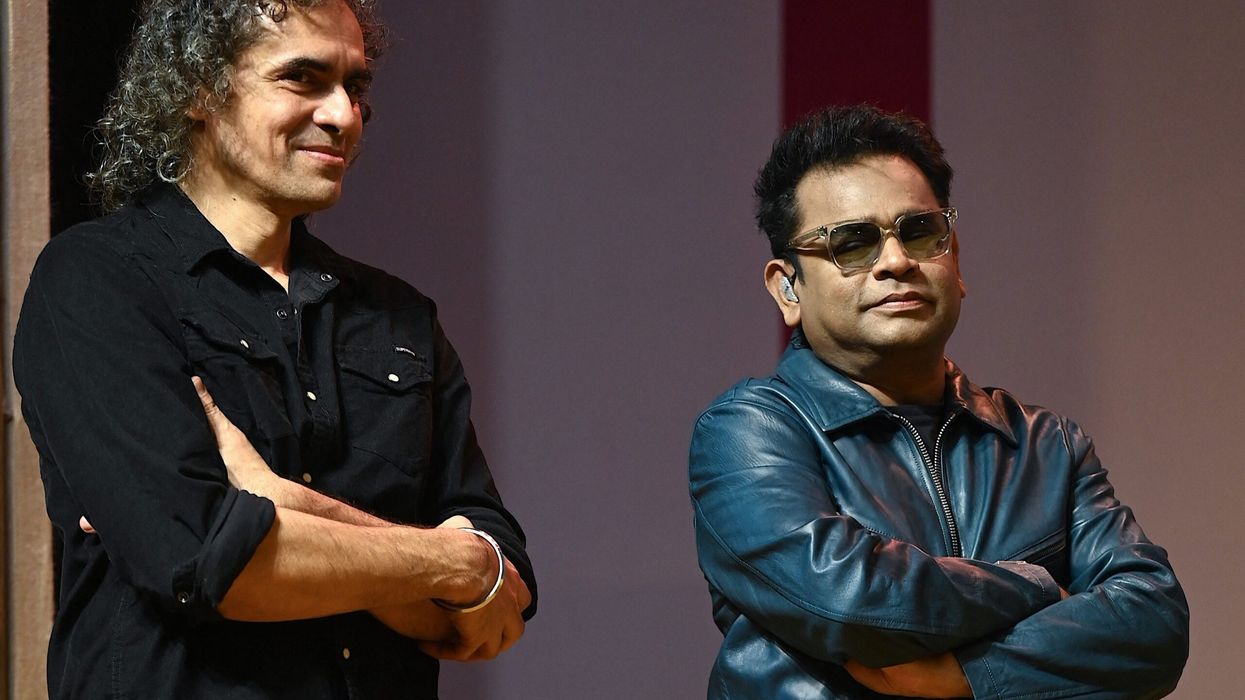One is a director, the other a composer. And together Imtiaz Ali and A R Rahman, the duo behind hit albums of films such as Rockstar, Highway, and Tamasha, are just two music aficionados jamming together.
The two, back together for Amar Singh Chamkila, say theirs is a connection that goes beyond a simple director-composer equation. It’s one that started on a poetic note with Ali reciting Punjabi preacher-poet Baba Farid's famous lines "Kaga Sab Tan Khaiyo" to the Tamil-speaking Rahman during the narration of "Rockstar".
"He didn't know anything about my work," Ali told PTI, recalling his first meeting with the Oscar-winning music maestro.
"I liked his hair," added Rahman about his director’s famous unruly mop of curls that have become a signature of sorts for him.
Ali, of course, knew everything there was to know about Rahman's music, not just in Hindi cinema but in Tamil as well. But they really connected over Baba Farid.
The conversation inspired the 2012 film's famous song “Naadan Parindey”, sung by Mohit Chauhan.
"I felt I had your attention," Ali told Rahman about the meeting at the musician’s Chennai studio years ago.
Ali said his producers had told him to "catch hold" of the musician at any cost for the movie, starring Ranbir Kapoor and Nargis Fakhri.
"Working with him, all borders disappear. We don’t think, 'He is the director and I’m the composer'. We just jam with it and we think how we can make this interesting, and how we go deeper into something. He has a great sense of picking up tunes, lyrics, so I trust his instinct. He's a fan of music, lyrics, great poetry, psychology and philosophy," Rahman told PTI.
Their latest collaboration Amar Singh Chamkila, about the popular 80s grassroots Punjabi singer who was shot dead along with his wife and singing partner Amarjot, will start streaming on Netflix from April 12.
The challenge with the film, Rahman said, was that Chamkila wrote and sang his own songs.
"My question was, ‘Chamkila already has songs, so what am I going to do in it?’ We sat and figured it out," he said.
The film will see lead stars Diljit Dosanjh and Parineeti Chopra sing several songs. The other numbers, sung by Alka Yagnik, Mohit Chauhan, Rahman, Arijit Singh and others, play in the backdrop.
Ali and Rahman, both in their 50s, want to take Chamkila’s music across the world as they are catering to a global audience by telling the story of a person who came from rural Punjab.
Alka Yagnik sang “Agar Tum Saath Ho”, a popular romantic number from Tamasha and is back for “Naram Kaalja” in “Amar Singh Chamkila”.
Asked why veteran singers don’t get too many chances in playback singing today, Ali, 52, said, it was Rahman’s idea to rope in Yagnik, a popular voice of the leading ladies in the 90s and 2000s.
“She (sang), ‘Agar Tum Saath Ho’ and now, in retrospect, the whole world knows why. Alka ji’s voice could be very nice because it has a vintage quality but I couldn't see it at that time. Even this time, she has sung, ‘Naram Kaalja’ and it was his (Rahman’s) idea. Again, we didn’t expect it.”
Rahman, 57, who is particular about the singers he collaborates with, added, “The unfortunate truth is if somebody becomes popular, everybody goes to the person. They overuse that person and kill them.”
According to the music maestro, it is important to cast singers correctly and he said he managed to do that with both Yagnik and Richa Sharma in Maidaan, another Hindi film he has composed for.




